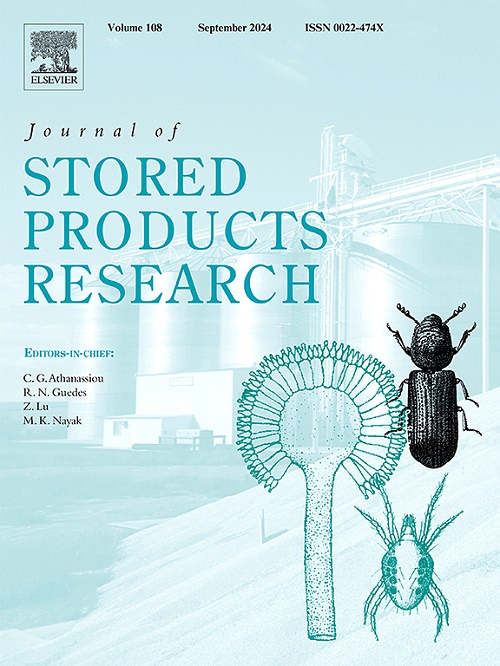不同温度对苏里南锯齿谷物甲虫(鞘翅目:蚕科)的影响及在贮藏枣中的潜在管理用途
IF 2.7
2区 农林科学
Q1 ENTOMOLOGY
引用次数: 0
摘要
苏里南锯齿谷物甲虫(Oryzaephilus surinamensis L. )已成为贮藏散枣的主要害虫。这项调查旨在阐明不同温度对甲虫的影响。在 4 °C 和 18 °C 的温度下,大约 52% 的成虫在没有食物的情况下存活了 10 天,而在 0 °C 的温度下,只有 7% 的成虫存活了 8 天,在 27 °C 的温度下,12% 的成虫存活了 10 天。此外,甲虫的三个阶段在零下 20 摄氏度的环境中培养了不同的时间。在处理过程中,它们要么自由活动,要么呆在枣内。在-20 °C下,自由成虫在 15 分钟、20 分钟和 25 分钟内的死亡率分别为 2%、61%和 86%。在-20 °C下暴露 30 分钟,处理过的成虫死亡率为 100%。然而,当甲虫在枣果内受到保护时,在-20 °C下孵化 1 小时后,死亡率仅为 25%。另外,在-20 °C下暴露 2 小时后,尽管甲虫被保护在枣内,但死亡率仍为 100%。同样,在零下 20 °C,幼虫在没有食物的情况下,30 分钟内约有 93% 的幼虫死亡,但当幼虫被保护在椰枣内时,2 小时内死亡率为 100%。这些结果可以为管理贮藏椰枣中的苏里南金龟子(O. surinamensis)提供熏蒸和其他杀虫剂的宝贵替代品。本文章由计算机程序翻译,如有差异,请以英文原文为准。
Influence of various temperatures on the saw-toothed grain beetle Oryzaephilus surinamensis L. (Coleoptera: Silvanidae) and the potential use for management in stored dates
The saw-toothed grain beetle Oryzaephilus surinamensis L. has emerged as a key pest of stored loose dates. This investigation aims to elucidate the effects of various temperatures on the beetle. About 52% of tested adult beetles survived without food for 10 days at temperatures of 4 °C and 18 °C, whereas at 0 °C, only 7% survived for 8 days, and at 27 °C, 12% survived for 10 days. Moreover, three stages of the beetle were incubated at −20 °C for different durations. They were kept either free or inside dates during the treatment. The mortality rate of free adult beetles at −20 °C was 2%, 61%, and 86% in 15 min, 20 min, and 25 min, respectively. Thirty-minute exposure at −20 °C resulted in 100% mortality of the treated adults. However, when the beetles were protected inside date fruits, the mortality rate was only 25% after 1 h of incubation at −20 °C. Alternatively, 2 h of exposure at −20 °C caused 100% mortality of the beetles despite being protected inside the dates. Similarly, treatment of larvae without food at −20 °C resulted in a mortality of about 93% of the populations in 30 min, but when the larvae were protected inside dates, 100% mortality occurred within 2 h. Furthermore, 2 h of exposure at −20 °C inhibited the hatchability of eggs inside dates by about 96.7%. These results could provide a valuable alternative to fumigation and other pesticides for the management of O. surinamensis in stored dates.
求助全文
通过发布文献求助,成功后即可免费获取论文全文。
去求助
来源期刊
CiteScore
5.70
自引率
18.50%
发文量
112
审稿时长
45 days
期刊介绍:
The Journal of Stored Products Research provides an international medium for the publication of both reviews and original results from laboratory and field studies on the preservation and safety of stored products, notably food stocks, covering storage-related problems from the producer through the supply chain to the consumer. Stored products are characterised by having relatively low moisture content and include raw and semi-processed foods, animal feedstuffs, and a range of other durable items, including materials such as clothing or museum artefacts.

 求助内容:
求助内容: 应助结果提醒方式:
应助结果提醒方式:


